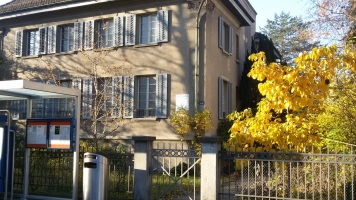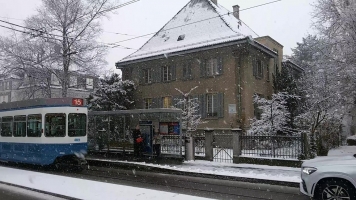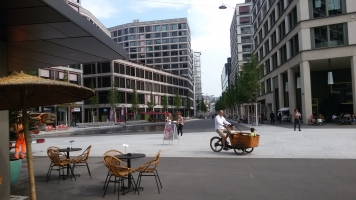Author Archives: Swiss-Immigration-Lawyer-Zurich-Bern-Basel-Geneva-Lausanne
There must be a positive effect on the Swiss (and possibly local) economy as a result of the applicant’s activities. Only proven or qualified specialists (e.g. senior managers or scientists) are eligible for work permits. There is a priority for resident workers. As a rule, the unavailability of such persons entitled to priority must be documented by means of advertisements (print and online media) and a list of any rejected candidates (with reasons).
Name Change: First Name, Surname, Maiden Name, Gender Name Change
In the event that your first name or surname puts you at a disadvantage, an application can be made to change the name. To do so, you must submit a request.
Changing your name
Basically, a change of name is there to eliminate disadvantages associated with the previous name. The mere desire to change your name is not sufficient. The reasons must be understandable, comprehensible (e.g. by means of supporting documents) and convincing. Alleged facts must be proven and not merely made credible. The asserted reasons must not be unlawful, abusive or immoral.
According to Art. 30 para. 1 of the Swiss Civil Code, the government of the canton of the person’s residence may approve a change of name if there are substantial reasons for doing so. The mere wish to change the name is not sufficient. Understandable, comprehensible and convincing reasons must be given. The reasons given must be substantiated by the applicant.
Name declaration
Under certain circumstances, it is possible to make a name declaration directly at the registry office. You then do not have to apply for a name change. To do so, however, some conditions must be met..
Registered partnership: If your marriage or registered partnership has been dissolved by a court (e.g. through divorce, annulment or invalidity), you can declare to the registry office at any time that you wish to use your unmarried surname again. This also applies if your partner is deceased.
Gender: If you are firmly convinced that you do not belong to the gender entered in the civil status register, you can change it directly at the registry office without any red tape. You can also change your name at the same time. As a rule, this includes the first name. If your surname or an intermediate name has a gender-specific ending, you can also change these parts of your name. The declaration follows the binary gender order: only the genders “male” and “female” can be registered. Under the age of 16, the consent of the legal representative is required.
Regulations for joint children
If the parents of a child are not married to each other, the first joint child is automatically given the mother’s surname at birth.
Should the parents have joint or sole custody of the child, they can choose the father’s surname for the first child within one year of declaring custody. If the child has reached the age of twelve, he or she must consent to the change.
Married parents who chose the surname of their children when they got married can declare within one year of the birth of their first child that it should be given the surname of the other parent.
Sole name after divorce: The name change is to be distinguished from the name declaration. If, for example, you would like to use your single name again after a divorce, you can have this change made at the relevant registry office without giving reasons.
If your application for a name change is rejected, as competent lawyers at your side we can file an appeal with the relevant higher court.
Extending your residence permit after divorce or the death of a partner.
Extending your residence permit after divorce or the death of a partner.
Did you come to Switzerland on the basis of family reunification? Your residence permit may not be extended if the person who is the reason for your residence permit dies. The same applies if you separate or divorce.
In principle, your residence permit will be reviewed after the death or dissolution of the family relationship. However, if you have a permanent residence permit (C permit), you can stay in Switzerland.
Under certain conditions, you can also stay in Switzerland with a B permit. You can have your residence permit extended if:
For EU and EFTA nationals
You can apply for a residence permit in your own name if you are gainfully employed or have sufficient financial means to support yourself.
Third-country nationals
After the dissolution of the marriage or family relationship, the foreign spouse and children are still entitled to the issue and extension of a residence permit if:
you have been married to your (Swiss or foreign) partner for at least 3 years and have lived together.
you are well integrated in Switzerland (good oral language skills and willing to work or study).
an extension of residence permit is necessary for important personal reasons. Such important personal reasons exist in particular if the spouse has been the victim of spousal violence and social reintegration in the country of origin appears to be at serious risk.
Swiss Federal Supreme Court: In its landmark ruling of December 9, 2009, the Federal Supreme Court clarified the question of whether the provision requires the spouses to have resided in Switzerland for three years. The Federal Supreme Court answered this question in the affirmative and also referred to a historical and systematic interpretation. However, the decisive factor for the Federal Supreme Court was apparently the requirement of successful integration, which was also included. According to the Federal Supreme Court, both criteria, expiry of the time limit and integration, must be met cumulatively. However, successful integration in Switzerland necessarily requires that the foreign national has resided here for a certain minimum period of time; if the period of residence is less than three years, it is hardly possible to speak of a consolidated professional and personal bond with Switzerland. In addition, information on marital relationships lived abroad can often only be verified inadequately or not at all. If the time spent abroad were to be taken into account within the three-year period, the cantonal licensing authorities would often have to rely on the mere assertions of the applicant. Such a solution would hardly be practicable, especially as it would not be possible to counter abusive behavior in this way.
Loss of a residence permit after separation, divorce or the death of a partner
Any person who has been refused a residence permit or whose residence permit has been revoked has the right to appeal against this decision before an independent court. If the violation of the right to be heard, including the reasons for the decision and the prohibition of discrimination, is contested, the Federal Supreme Court is the final instance.
As an attorney and lawyer, I have been solving everyday and complex cases for twenty years. I would be happy to help you analyze the core problem. Talk about your problems, formulate your questions and seek advice at an early stage.
Lawyer for Family Reunification in Switzerland
Applying for family reunification in Switzerland & appealing against any rejection with the help of a competent Swiss immigration lawyer.
Under certain conditions, if you live in Switzerland but your family lives abroad, you can have your children or spouse join you in Switzerland. Immigration law does not provide for the reunification of relatives in the ascending line and is only possible in a few exceptional cases. This is called family reunification. The purpose of family reunification is to enable the family to live together and to provide legal security.
Whether and which of your family members can join you in Switzerland also depends on your nationality. You can submit applications for family reunification or to prepare for marriage. A distinction is made between
Family members of citizens from an EU/EFTA country
Family members of persons from a third country
Family members of Swiss citizens
For EU and EFTA Citizens
You are entitled to have the following family members join you in Switzerland if you have EU/EFTA citizenship:
Spouse or registered partner
Children or grandchildren under the age of 21 or who are granted maintenance
Parents and grandparents, provided they are granted maintenance
Family members of EU/EFTA citizens are entitled to the issue and extension of a residence permit. The person joining them may work in Switzerland as soon as the permit has been issued.
You can submit your application for family reunification to your municipality.
Your partner’s visa can be approved for three months in order to prepare for the marriage and conclude the marriage under civil law within this period. To do this, you must obtain confirmation from the registry office before entering the country. This must show that the marriage has been initiated and can take place within a reasonable period of time. In addition, the other requirements for family reunification must be met. Once you have submitted the marriage certificate, the residence permit can be issued. If the marriage does not take place, no residence permit will be issued and the bride or groom must leave Switzerland.
Applicants from third countries (Outside EU/EFTA)
Dependants of persons with a permanent residence permit (C) Foreign spouses, registered partners and unmarried children under the age of 18 of persons with a permanent residence permit are entitled to a residence permit if certain requirements are met. Further information on the requirements can be found below.
Family members of persons with a residence permit (B) or short-term residence permit (L) Foreign spouses, registered partners and unmarried children under the age of 18 of persons with a residence permit or short-term residence permit can be granted a residence permit or short-term residence permit if certain requirements are met. Further information on the requirements can be found below.
Family members of temporarily admitted persons and temporarily admitted refugees (F) Spouses, registered partners and unmarried children under the age of 18 of temporarily admitted persons and temporarily admitted refugees can join them after three years at the earliest. The following requirements must be met.
Pre-requisites for family reunification. The above-mentioned groups of persons from third countries may be joined by their family members if
– they live together with them;
– a suitable home is available;
– they are not dependent on social assistance;
– they can communicate in the national language spoken at the place of residence;
– the person joining them does not receive any annual supplementary benefits or could receive them due to the family reunification.
Legal deadlines for family reunification
Family reunification must be applied for within five years for spouses and children. Children over the age of twelve must be reunited within twelve months. Otherwise, family reunification will only be approved if important family reasons are invoked.
Making preparations for marriage
You can obtain a residence permit for your partner for three months in order to prepare for the marriage and conclude the marriage under civil law within this period. To do this, you must obtain confirmation from the registry office before entering the country. This must show that the marriage has been initiated and can take place within a reasonable period of time. In addition, the other requirements for family reunification must be met. Once the marriage certificate has been submitted, the residence permit can be issued. If the marriage does not take place, no residence permit will be issued and the bride or groom must leave Switzerland.
Converting an F or L permit into a B permit (with Lawyer)
Converting an F or L permit into a B permit
As a general rule, it is possible to convert an F or L permit into a B permit, but specific conditions and procedures apply. As a rule, an L permit can be converted into a B permit if proof of permanent employment or employment for a fixed term of at least 365 days can be provided.
Conversion of F permit to B permit – Application will be reviewed according to the following criteria:
– An uninterrupted stay in Switzerland of at least five years;
– Proven identity
– Compliance with the following integration criteria:
– Observance of public safety and order (no debt collection, no certificates of loss, no violations of legal provisions)
– Respect for the values of the Federal Constitution
– Language skills (oral skills at least at reference level A1)
– Participation in economic life or acquisition of education (for at least one year)
– Family situation, in particular the date of school enrolment and the duration of school attendance of the children
– State of health
– Possibilities for reintegration in the country of origin
– There is no entitlement to the granting of a residence permit; any granting of a permit is at the discretion of the authorities.
– Each adult family member must submit a personal application.
L Permit to (B permit) Conversion (with Lawyer)
Short-term residence permit (L permit)
The Immigration Office can issue a short-term residence permit for foreign nationals intending to stay in Switzerland for less than a year for a specific purpose.
However, the short-term residence permit can be issued with or without gainful employment. Yet it is invariably tied to a specific purpose. The period of validity of a short-term residence permit depends on the purpose of your stay and can be up to 364 days. If your purpose of residence is gainful employment for less than one year, the permit is valid for as long as your employment contract.
The short-term residence permit can be extended or renewed.
If you are an EU/EFTA national and lose your job or your employment contract has expired, you can generally remain in Switzerland as a jobseeker for 6 months.
For the conversion of a short-term residence permit (L) into a residence permit (B):
The applicant must submit the new current employment contract/work contract, which must be valid beyond the expiration date of the old L permit, to the Residents’ Registration Office of the municipality of residence approx. 2 weeks before the L permit expires. The Residents’ Services will forward the documents to the Migration Office for examination of the extension/renewal or conversion of the L permit. If a new permit is issued, the Migration Office will forward it to the municipality of residence.
If you find that there may be trouble with the application or there is a threat of rejection of the application, you can seek legal advice and this is where we come to your assistance.












